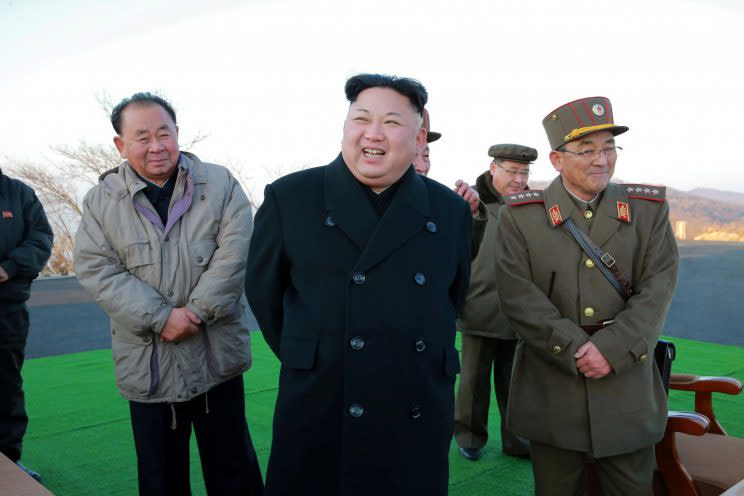Trump knocks China as Tillerson heads to Beijing
WASHINGTON — President Trump on Friday knocked China for not doing enough to curb North Korea’s nuclear and missile programs — even as Secretary of State Rex Tillerson headed to Beijing as part of a high-stakes diplomatic swing through Asia.
“North Korea is behaving very badly,” Trump said on Twitter. “They have been ‘playing’ the United States for years. China has done little to help!”
It was hardly the first time that the president has complained that China wasn’t doing enough to help rein in the secretive Stalinist regime in Pyongyang. But the timing of this salvo was unusual: It came as Tillerson was bound for Beijing as part of a trip that has also taken him to Japan and South Korea, where he warned that the U.S. may use force against North Korea.
“Let me be very clear: The policy of strategic patience has ended,” Tillerson said Friday at a press conference in Seoul. “We are exploring a new range of diplomatic, security and economic measures. All options are on the table.”
Asked about the possibility of preemptive U.S. military action, Tillerson replied: “Certainly, we do not want for things to get to a military conflict. We are quite clear in that, in our communications,” the secretary said. “But obviously, if North Korea takes action that threaten the South Korean forces or our own forces, then that would be met with an appropriate response. If they elevate the threat of their weapons program to a level that we believe requires action, that option is on the table.”
Tillerson added that he would press China to step up efforts to punish North Korea economically.
But the secretary of state also was slated to use his stop in Beijing to lock down the dates and location for a visit to the U.S. by Chinese President Xi Jinping. U.S. officials told Yahoo News last week that the tentative plan was for an early April meeting at Trump’s private Mar-a-Lago club and estate in Florida.

In recent days, however, Washington and Beijing have stepped up mutual criticisms, leading to questions about whether the timing is right for a summit, and what concrete benefits such a meeting might have.
North Korea is one of Trump’s most difficult national security challenges. On Barack Obama’s watch, Pyongyang made enough progress on nuclear weapons and ballistic missiles that, experts predict, it could strike the U.S. mainland, possibly even the East Coast, in two to three years.
The Obama administration enlisted China and other world powers in two rounds of international sanctions, and left Trump options for further tightening the economic vise, according to administration and congressional sources. China is the key to North Korea policy because it’s the smaller country’s patron — its source of food and fuel.
Punitive economic measures haven’t deterred North Korea, which announced in January that it could launch an intercontinental ballistic missile “at any time.” The U.S. responded that it would shoot down any missile, but the back-and-forth highlighted how international diplomacy and economic sanctions have not worked to date, leaving Trump very few options for facing down an escalating threat.
“North Korea’s growing capability is one of the most significant challenges the next administration will face. There are no simple solutions,” then-Vice President Joe Biden said in a January speech about nuclear policy. “We must continue working closely with the international community — including China — to convince North Korea to reverse course.”
After Pyongyang’s January missile threat, Trump tweeted: “North Korea just stated that it is in the final stages of developing a nuclear weapon capable of reaching parts of the U.S. It won’t happen!”
Trump, then the president-elect, added, “China has been taking out massive amounts of money & wealth from the U.S. in totally one-sided trade, but won’t help with North Korea. Nice!“

Beijing doesn’t want North Korea to collapse, which would potentially send refugees streaming into China, to say nothing of raising doubts about the security of North Korea’s nuclear weapons. It also doesn’t want North and South Korea to reunite, fearing that the result would be a U.S.-aligned country on its borders.
“I think we have to be clear-eyed as to how far China will go and not get overly optimistic as to how far they’ll go,” Tillerson told a Jan. 11 hearing on his confirmation as Trump’s secretary of state.
“If China is not going to comply with … U.N. sanctions, then it’s appropriate for us — for the United States — to consider actions to compel them to comply,” he added.
That statement raised eyebrows even among some Republican members of the Senate Foreign Relations Committee, who wondered privately how the Trump administration would compel China to do something it considers profoundly risky — choking off trade and therefore risking North Korea’s collapse.
“There’s probably no bilateral relationship that carries more significance and where there’s also the potential if that relationship breaks down or goes into full conflict mode that everybody is worse off,” Obama told reporters in a December press conference.
Read more from Yahoo News:



